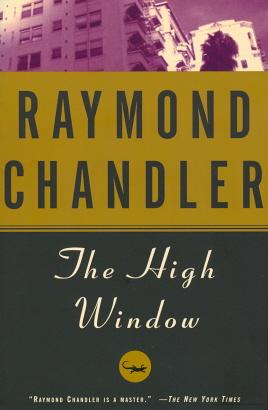
Edward Winter

Dominique Thimognier (St Cyr sur Loire, France) quotes the final paragraph of Raymond Chandler’s novel, featuring Philip Marlowe, The High Window (1942):
‘It was night. I went home and put my old house clothes on and set the chessmen out and mixed a drink and played over another Capablanca. It went 59 moves. Beautiful cold remorseless chess, almost creepy in its silent implacability.
When it was done I listened at the open window for a while and smelled the night. Then I carried my glass out to the kitchen and rinsed it and filled it with ice water and stood at the sink sipping it and looking at my face in the mirror.
“You and Capablanca”, I said.’
Our correspondent notes four victories by Capablanca in 59 moves (all as White): against J. Corzo (Havana, 1901), Oskam (Middelburg, 1911), Whitaker (Washington, 1915) and Horowitz (New York, 1931).
We add that the first of these was given on page 130 of The Unknown Capablanca by David Hooper and Dale Brandreth (London, 1975), with this concluding note:
‘An endgame of master class, apart from a few hesitations; but even a master would hardly play it as fast – a rate of 147 moves an hour.’
It seems highly unlikely, however, that the game was ever accessible to Chandler. Although published in the Cuban press at the time, it was long regarded as untraceable. It was presented in an article by Paul Leith on pages 325-326 of the November 1960 BCM, following research by Miguel Alemán.
The Oskam game was given on pages 38-39 of our monograph on Capablanca, taken from the Middelburgsche Courant of 9 September 1911. Our book (page 87) also included the Whitaker game, from pages 70-71 of the April 1915 American Chess Bulletin. Both victories occurred in simultaneous exhibitions.
Capablanca’s (tournament) win over Horowitz has always been readily available, without being widely anthologized.
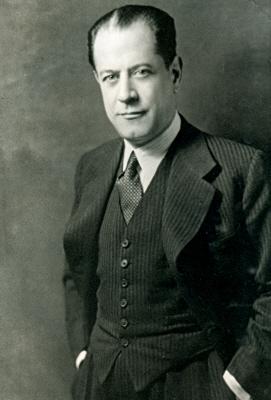
José Raúl Capablanca
The High Window has a number of references to chess, and particularly in chapter 15, which begins:
‘The chessmen, red and white bone, were lined up ready to go and had that sharp, competent and complicated look they always have at the beginning of a game.
... I opened a little paper-bound book of tournament games published in Leipzig, picked out a dashing-looking Queen’s Gambit, moved the white pawn to queen’s four, and the bell rang at the door.’
Two or three pages later Marlowe says to his visitors:
‘I play over tournament games that have been recorded and published. There’s a whole literature about chess. Once in a while I work out problems. They’re not chess, properly speaking. What are we talking about chess for? Drink?’
(5611)
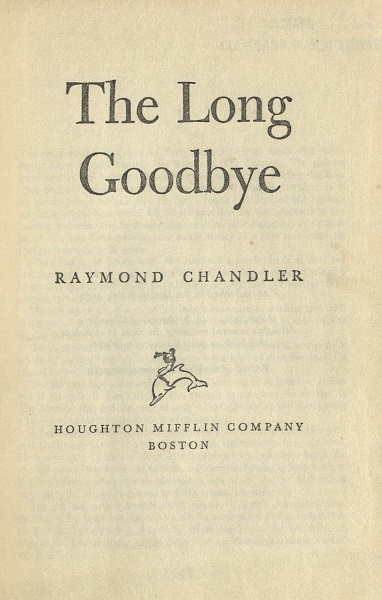
Some alleged quotations:
‘Life’s too short for chess’ – Henry James Byron;
‘Chess is a foolish expedient for making idle people believe that they are doing something very clever, when they are only wasting their time’ – George Bernard Shaw;
‘Chess is possibly the only game in the world in which it is impossible to cheat’ – John Steinbeck.
The Internet is awash with such pseudo-quotes. All have been discussed in C.N. (see the Factfinder) and are examples of a practice referred to as follows in C.N. 9413:
Any colourful approbation or disapprobation of chess in the output of an eminent literary figure is liable to be quoted as representing his own views even if expressed only by a character in a work of fiction.
Another case will be examined now:
‘Chess is as elaborate a waste of human intelligence as you could find anywhere outside an advertising agency’ – Raymond Chandler.
A point of evident indifference to some chess websites is that the essentials of this ‘Chandler quote’ have been examined in fine style on a Quote Investigator page. It was a remark by the narrator, Philip Marlowe, in The Long Goodbye, a novel by Raymond Chandler (London, 1953 and Boston, 1954).
We add that the text was discussed by Montgomery Major, the then Editor of Chess Life, in D.J. Morgan’s Quotes and Queries column, in the November 1957 BCM, pages 294-295:
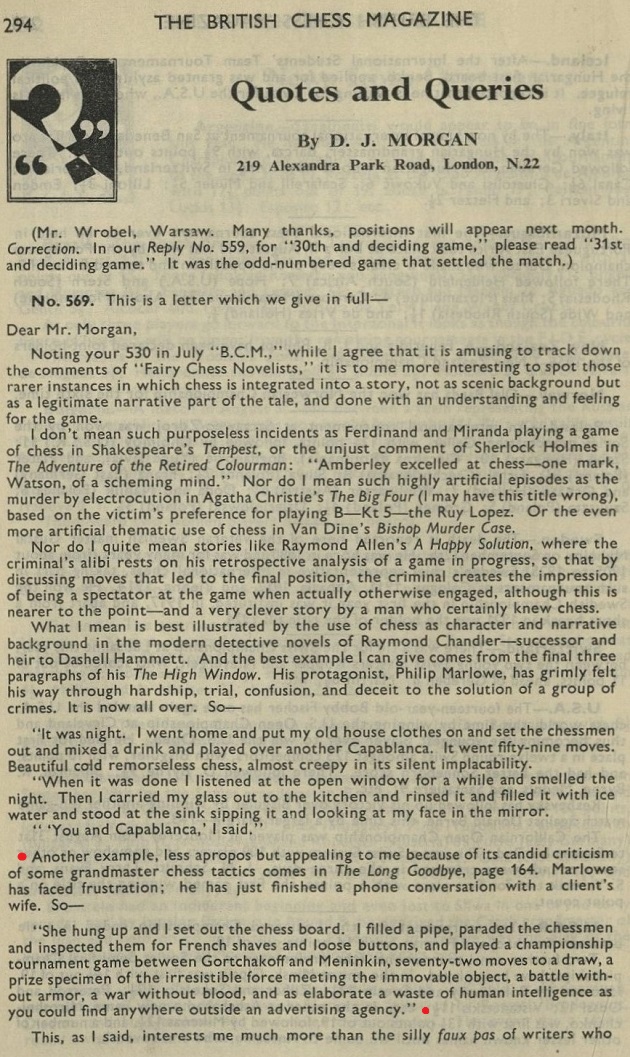

Below is the relevant part of The Long Goodbye, with full context, on page 128 of the first US edition:
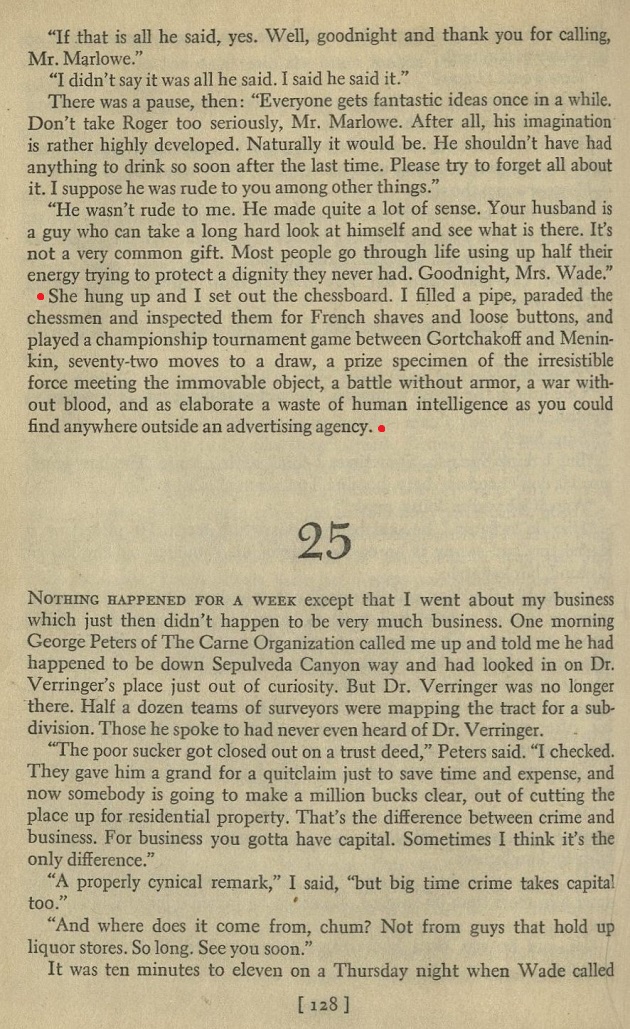
The highlighted passage, consisting mostly of one long sentence, prompts us to underscore Montgomery Major’s observation about ‘candid criticism of some grandmaster chess tactics’: the private detective’s comment about ‘a waste of human intelligence’ refers not to chess in general but to the 72-move draw between Gortchakoff and Meninkin.
An earlier Quotes and Queries item (number 181 on page 154 of the May 1954 BCM) also concerned Raymond Chandler and The Long Goodbye:
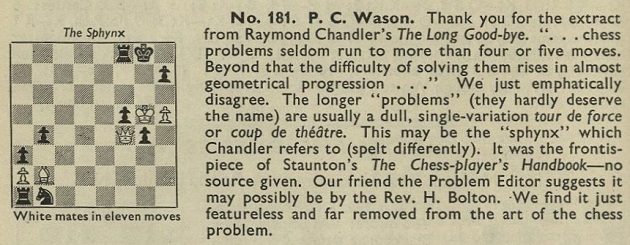
From pages 194-195 of the US edition of the novel:


Regarding the Sphynx problem, our feature article Howard Staunton includes the brief text of C.N. 1190:
In New in Chess issue 3/1986 the readers’ letters section suddenly comes alive with a series of excellent contributions on the Sphynx problem in Staunton’s Handbook.
In 2016 the matter was discussed in admirable detail by Michael Clapham in his Chess Book Chats series. See part one and part two.
The scans in the present article have been provided by the Cleveland Public Library. As so often, we are greatly indebted to Mr William Chase and Mr Raymond Rozman.
(12177)
See also Chess and the Wallace Murder Case, which includes the following:
‘The Wallace case is the nonpareil of all murder mysteries ... I call it the impossible murder because Wallace couldn’t have done it, and neither could anyone else. ... The Wallace case is unbeatable; it will always be unbeatable.’ (Raymond Chandler, in Raymond Chandler Speaking).
To the Archives
for other feature articles.
Copyright Edward Winter. All rights reserved.